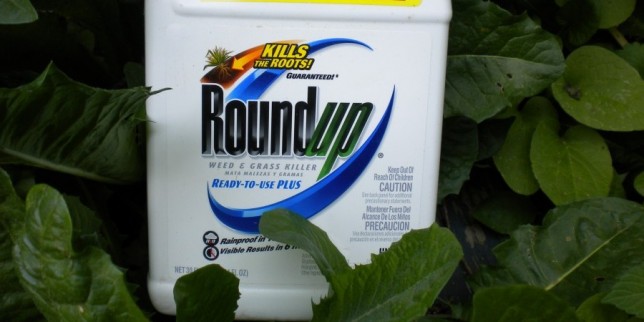Sri Lanka has beome the first country to ban the sale of Monsanto’s “Roundup” glyphosate weedicide after a study found that the weedicide is responsible for the increasing number of chronic kidney disease patients.

Update: The Sri Lankan government will not impose a total ban on Roundup herbicide. It seems that the government of Sri Lanka has caved in to the plantation lobby and decided to “restrict” the herbicide only in areas where the disease is prevalent.
Minister of Special Projects S.M. Chandrasena said the decision to ban Glyphosate sales in the country has been taken on a directive of the President Mahinda Rajapaksa.
Source: www.colombopage.com
Addressing a media briefing, the Minister said several programs have been implemented to prevent the high occurrence of kidney disease among the farming community.
Fact Box: The Sri Lankan Agriculture Ministry banned the import of Roundup and the pesticides Carbaryl, Chlorophyriphos, Carbofuran and Propanil last year due to fears that the chronic kidney disease amongst farmers could be linked to them. However, this latest President’s order now bans all local sales from the stocks that are still available of Roundup, in reaction to the study.
A new study published in the International Journal of Environmental Research and Public Health found a link between the weedicide known as Roundup and the fatal Chronic Kidney Disease of Unknown origin (CKDu) affecting mostly, the rice farmers in Sri Lanka and several other countries.
The study found that while the weedicide itself is not nephrotoxic, when it combines with hard ground water containing metals such as cadmium and arsenic, either naturally present in the soil or added through fertilizer, glyphosate becomes extremely toxic to the kidney. In recent years a significant increase in the number of CKD patients has been observed in some parts of the country, especially in North Central, North Western, Uva and Eastern Provinces.
According to the Minister a national program to prevent the kidney disease will be launched next Friday. The program will encourage the Sri Lankan farmers to produce and use organic fertilizer.
Dr. Channa Jayasumana of Rajarata University, the lead author of the study on glyphosate, told the national radio that paddy has been planted without the use of chemical fertilizer in an extent of 100 acres in the left bank of Rajanganaya and plans are underway to plant traditional paddy varieties in 5,000 acres of land in the right bank also.
The Ministry of Agriculture aims to cultivate paddy in 100,000 acres of land throughout the country in the Maha season using organic fertilizer.















This news report needs modification. The so-called ‘ban’ is a limited use directive in the areas with kidney disease. See Sunday Times (march 3rd) article entitled “no total ban”
http://www.sundaytimes.lk/140323/news/dangerous-weedicide-no-total-ban-90193.html
And the sleight of hand here is that they distract you with:
“The study found that while the weedicide itself is not nephrotoxic, when it combines with hard ground water containing metals such as cadmium and arsenic, either naturally present in the soil or added through fertilizer, glyphosate becomes extremely toxic to the kidney. ”
And how does one go about spraying this chemical anywhere else?
YOU NEED WATER TO MIX IT WITH WHICH CONTAINS “METALS”
The trick here is to design the chemical so that by itself “it is safe,” but then hide the trigger inside the missing component:
=WATER !!!
Which by default contains metals that are “naturally present” especially if it is unfiltered tap water.
You clean hallways, floors, everything pretty much WITH WATER!
The process of active poisoning continues. You get some roundup on you, your clothes, you go home and wash it with WATER. Then your home, your washing machine becomes contaminated.
Will anyone who has designed a death chemical tell you exactly how and why it works? I don’t think so.
So either way, the trap is set. Dumb humans too trusting get screwed all the time.
Politicians who either get bribed or threatened make policy based on the amount of either.
Look at this doctor who brazenly offered to drink glyphosate claiming it to be safe, who then backed down when offered a glass of glyphosate during an interview.
http://www.newsweek.com/patrick-moore-scientist-who-offered-and-then-refused-drink-glyphosate-weed-317289
Pilate is alive and well!